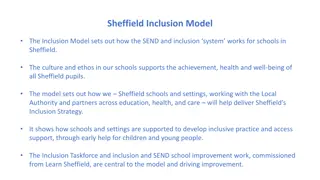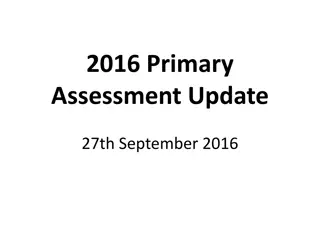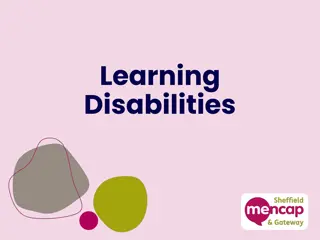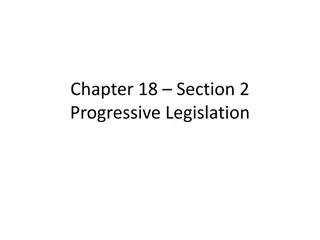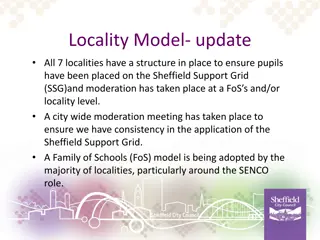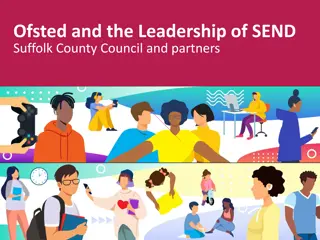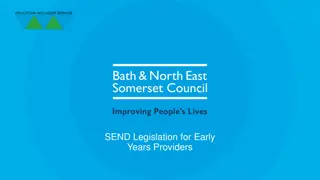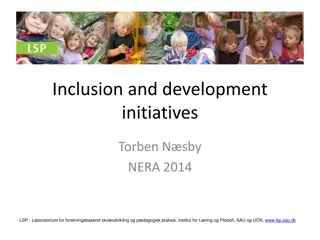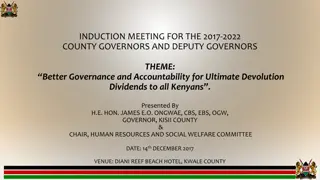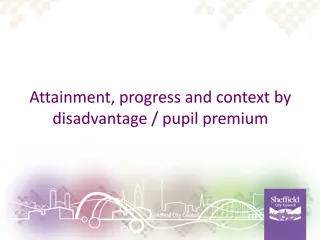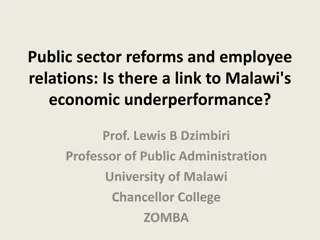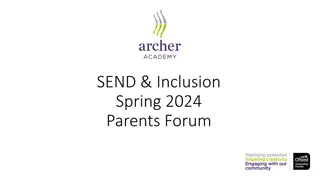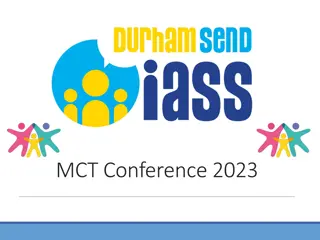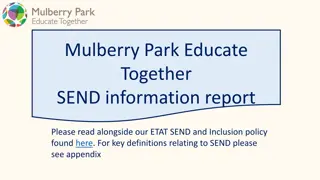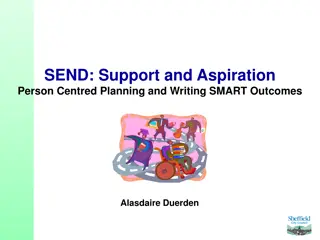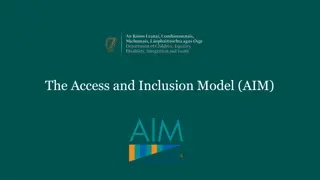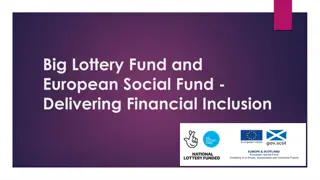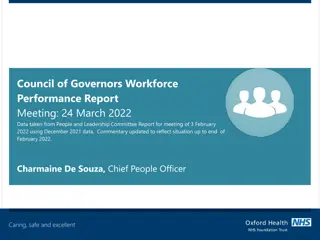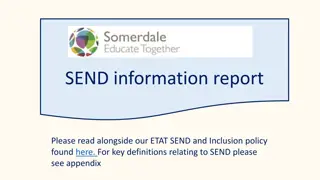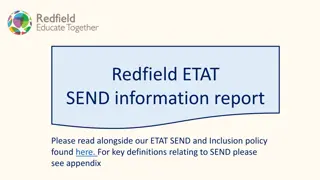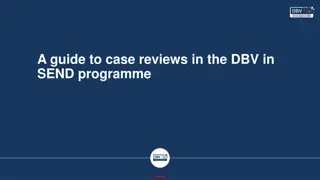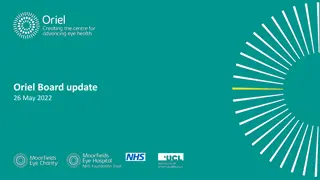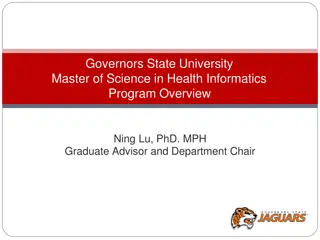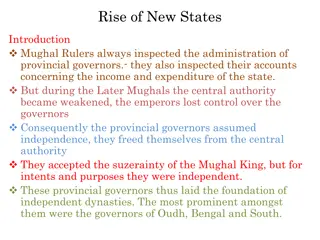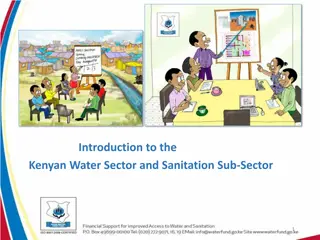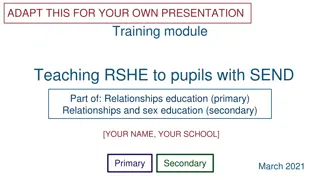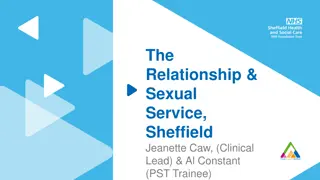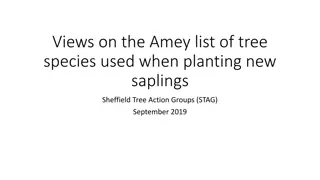Inclusion Programme & SEND Reforms in Sheffield Update for School Governors (June 2016)
Sheffield is undergoing significant reforms in its inclusion programme and SEND services, aiming to provide better support for vulnerable young people and their families. The vision includes a shift towards a locality model, ensuring high-quality inclusive provision, robust mental health support, and improved communication. Success will be measured by enhancing professional confidence, reducing exclusions, improving transitions to adulthood, and decreasing the need for specialist support. The strategic programme focuses on integrated locality delivery, SEND reforms, inclusive learning, funding allocations, and organizational design within the 0-25 age group. Collaboration among various roles and interdependencies with related programmes are crucial for achieving the desired outcomes.
Download Presentation

Please find below an Image/Link to download the presentation.
The content on the website is provided AS IS for your information and personal use only. It may not be sold, licensed, or shared on other websites without obtaining consent from the author. Download presentation by click this link. If you encounter any issues during the download, it is possible that the publisher has removed the file from their server.
E N D
Presentation Transcript
Inclusion Programme & SEND Reforms in Sheffield Update for School Governors June 2016 Stuart Williams PEP
Inclusion: Vision School fundamental shift to a locality model of inclusion support for vulnerable young people and their families Forum July 2015: A Social Care VI Supported by locality facing services Capacity, Leadership, 0-25, Specialism MAST HI Over the next five years we will transform the lives and futures of vulnerable children people. Parental confidence in the education, care and health system will be very high and families will be well supported to enable their children to succeed. Our practice will be the best in the country. and young EPS SEND EYS Autism
Inclusion: Delivery Co- Key working Leadership Capacity, Leadership, 0-25, Specialism location Achieved through High quality inclusive provision Early high quality support Robust Mental Health Provision Support for families Excellent communication and greater transparency
Inclusion: Measuring Success Professional confidence to support all vulnerable children and young people. Capacity, Leadership, 0-25, Specialism Progress and achievement of all vulnerable groups in every phase of learning Behaviour: reduction in exclusions Transitions to adulthood: reduced numbers of disengaged & unemployed Social Care & CAMHS: reduced numbers needing specialist support Attendance: decreases in persistent absence
Inclusion: Strategic Programme Integrated, Locality Delivery of Inclusion Support (Director: Antony SRO: Tim PM: Alasdaire) 0-25 SEND Reforms (Alasdaire) Inclusive Learning (Tim) Funding and Places** (Alasdaire) EHC Plan Conversions Karen Organisational Design (0-25 SEND Team) Tim/Dawn SEND Funding Allocation Alasdaire Assessment & Planning Pathway Stuart SEND Locality Working Tim IRs & Hubs Karen My Plan Roll Out Alasdaire SEN Transport Dominic Joint Commissioning/Personal Budgets Tim Local Offer Julie Development of New Post-16 Provision Dee Admissions & Place Planning Alena Health Pathway Kate Autism Strategy Stuart SEND Grant Chris Social Care Pathway Phil/Dorne Re-Commissioning SIC Tim All Age Learning Disability Strategy Tim Early Help and Support Offer Dawn Outreach & Behaviour Support Tim Respite & Short Breaks Review Jon ** Overseen by PLT Placement & Funding Group Workforce Development (Tim), Communications (Matt), Parental Engagement (Rebecca), Young People's Voice (Rebecca); Data (Jeremy) Interdependencies: Best Start Healthy Child Programme CYPF Budget Strategy Building Successful Families Programme Early Help & Support Strategy Neglect Strategy All Age Disability Strategy Emotional Health and Well Being (including Future In Mind)
Inclusion: SEND Core Requirements Local Offer Review and response published; Re-formatted and updated; Road map for future changes focus on content Education, Health and Care Assessment and Planning Pathway Core process agreed and now in place Health Task & Finish Group have agreed the process for Health Social Care Task & Finish Group are developing the process for Social Care My Plan Parental/Young Person Engagement Parents group chaired by Jayne Ludlam (highlighted as best practice by DfE) Parent and young people working groups involved in the development of the Local Offer Parental input to EHC Assessment and Planning Pathway Monthly meetings with Parent Carer Forum SEND specific questions included in the Every Child Matter survey Joint Commissioning Children s Joint Commissioning Group Joint Commissioning Task & Finish Group set up to develop SEND commissioning strategy
Inclusion: Delivery through Localities Central, locality-facing Inclusion Services Localities taking shape School LocalitiesA-F Children & Young People Learn Sheffield & Special Schools Local decision making 2.1m shared between localities Person-Centred Planning Person-Centred Planning Embedded with Inclusion Strategy Overseen by Inclusion Board Autism, EPS, EYS, SEND, MAST, CWD, HI, VI Supported by Health Delivering a step change in the consistency and quality of practice in support for children and young people with additional needs
Inclusion: Tools for Localities My Plan SEN Support Transparent, accountable non-statutory Plan Quickly identifies need, agrees support, agrees outcomes, monitors progress Increase in parental confidence in mainstream schools Now in use and built into New Ways of Working Sheffield Support Grid (SSG) Consistent approach to identifying SEND and providing support across Sheffield Helps schools and localities to identify strategic solutions to delivering support Most Localities have completed moderation of audit of SSG levels for C/YP. Submission of SSG levels for Localities deadline 11th July 2016 Quality Assurance Framework Central panel attended by localities- 3 Meetings to date Ensures consistent, city-wide application of Sheffield Support Grid City wide Moderation of SSG decisions completed June 2016
Key process change: Judgements about agreement to assess for an EHC Plan are made within school based reviews. A core group (Locality SENCO; SEND locality lead; Senior EP) join an agree to assess review (attended by the parent/carer, school staff and all involved practitioners) and give a decision and explain it within the meeting. Yes decisions can lead immediately into drafting an EHC Plan No decisions lead immediately into improving the MyPlan
High Needs Funding: Draft Future Model Integrated Resources Special Schools Early Years Mainstrea m Schools Post-16 PRU Place ( 2- 3k) + Notional SEN Funding ( 6k) Level 1 FEL ( ?) Post-16 Formula ( 10k) Place Funding ( 10k) Place Funding ( 10k) Place Funding ( 10k) Support Funding? PRU Block? Special School Block? Post-16 Central Block IR Block? Localities Block Level 5 Complex Cases Fund
Allocation Methodology for Schools Continue current Band C & D Funding 432k 66 Band Cs; 4 Band Ds mainly in primary schools funding still allocated to school while pupil remains in setting two payments: 5/12ths in April; 7/12ths in September funding returns to overall allocation pot when pupil leaves setting As C/D pupils leave settings, funding returns to overall allocation pot 1.14m Balance for Proportional Allocation two payments: 5/12ths in April; 7/12ths in September Year One: first payment made based on numbers of SEN in a locality as a proportion of all SEN in the city based on the January 2016 school census Year One: second payment based on numbers of identified L3, 4 & 5 pupils as a proportion of all L3, 4 & 5 pupils in the City using the Sheffield Support Grid Year Two (and thereafter): both payments based on numbers of identified L3, 4 & 5 pupils as a proportion of all L3, 4 & 5 pupils in the City using the Sheffield Support Grid Year One: moderated identification of all L3, 4 & 5 pupils will need to be completed by the end of the summer term Year Two: moderated identification of all L3, 4 & 5 pupils will need to be completed by February half-term and the end of the summer term
Special School Funding Proposals 10k Per Place Funding Savings through reducing places over time Fixed top-up funding per place 6k* *to be agreed Equity of funding between settings Principles of new funding strategy Over Level 5: Complex Cases Fund (Administered through the Special Headteachers Partnership with the LA) Sufficient funding for the most complex determined by need Special Schools and the LA work in partnership to manage all admissions for leaners who require specialist provision (including those who access independent and out of city provision)


